Strengthening farmers resilience to climate change
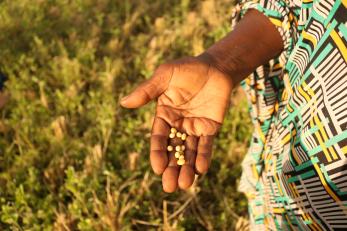
Over the past decade, conflict has plagued North East Nigeria, in which food insecurity remains an urgent need, requiring prompt and concerted efforts. The violent conflict in Borno State continues to exacerbate shocks and stresses, including population displacement, restrictions on the use of inorganic fertilizers, and the cultivation of tall crops in some parts of the State. Limited availability and accessibility of quality agricultural inputs such as certified seeds and fertilizers, lack of information, extension and advisory services from both the public and private sectors, as well as market disruptions that have led to fluctuating prices of basic staples has severely limited the coping options for displaced and host community households alike. Nonetheless, areas of Southern Borno such as Biu Local Government Area (LGA) are experiencing relative levels of stability where agricultural market systems, though thin, are more functional, and there are untapped market opportunities for the private and public sectors to play an active role and drive positive change beyond the life of donor-funded projects.
About Borno Agricultural Development Initiative (BADI)
Mercy Corps worked to strengthen the resilience capacities of 300 vulnerable households to shocks and stresses to climate change and food insecurity by introducing communities to sustainable, context-appropriate, and smart agricultural practices with support from the Bill and Melinda Gates Foundation. Through the 28-month Borno Agricultural Development Initiative (BADI) project, Mercy Corps supported farming households with the skill sets and linkages they needed, by the development of market systems for quality seeds and other agricultural inputs.
Furthermore, in order to strengthen the supply and distribution channels for certified seeds, organic crop protection products, fertilizers and bio-stimulants in Borno state. Mercy Corps worked with numerous partners throughout BADI implementation, including the National Agricultural Seeds Council (NASC), the Borno State Agricultural Development Program (BOSADP), the College of Education Waka in Biu, the Jikur Seed Company Ltd., which trained farmers on seed production, and Global Agro Limited (Contec), a private sector lead firm involved in the commercial production of soil-adapted, bio-based fertilizers and crop protection products. Among other contributions, partners delegated extension agents and expert staff, trained participants, and provided seed certification.
Mercy Corps was able to support community-based seed producer groups with the resources they needed to develop high-quality seeds for sale to other smallholder farmers. By integrating community level agricultural input retailers and entrepreneurs into the supply chain of a large organic input manufacturer like CONTEC Global Ltd, Mercy Corps has established a local-led supply and distribution systems of agricultural input accessible to farmers.
In light of the program coming to an end, this article would highlight some of BADI program achievements and success stories from participants, all extracted from this detailed report.
Our impact
- Seven demonstration farms identified and developed across the project locations in Biu and Damboa LGAs.
- Trained seven agricultural extension workers and seven lead farmers as trainers on Good Agricultural Practices (GAP) in Biu and Damboa.
- Trained eight village agents (VAs) (one female and seven male) on village savings and loan association (VSLA) methodology in Biu.
- Distributed agro-inputs to 570 participants (272 female and 298 male) across seven project communities in Biu and Damboa.
- Trained 120 smallholder farmers (59 female and 61 male) on hydroponics fodder (known as the best livestock feed) production for ruminant animals.
- Distributed Noiler birds to 184 smallholder farmers (92 female and 92 male).
- Distributed fodder materials to 120 smallholder farmers (59 female and 61 male).
- Distributed irrigation equipment to 182 smallholder farmers (45 female and 137 male) for dry season farmers.
- Trained 10 agriculture extension workers (AEW), lead farmers, and two partner staff (four female and six male) on permaculture and micro gardening.
- Distributed permaculture and micro gardening materials (multi-nutrients, PVC pipes and accessories, coco coir, stools, rice hulls, buckets, seeds, seed trays) to 180 project participants (76 female and 104 male).
Our participants’ feedback
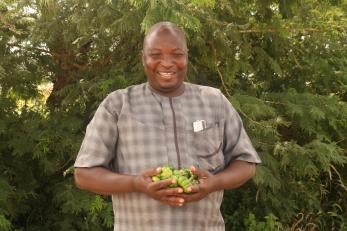
Farming is what Adamu has known all his life coming from a family of farmers and surrounded by farms. Now 45, Adamu supports his two wives and 15 children by growing mainly maize, cowpea beans, rice, tomatoes, and garden eggs in Tum community, Borno State. “With farming, I know I would always have something to fall back on and food for my family. This gives me a sense of security,” says Adamu on his motivation to farming.
In Nigeria, the impact of climate change is especially felt by farmers that practice only rainy season farming. Over the years the timing for the rainy season has become more unpredictable making it difficult for farmers like Adamu to know when to start planting and so their time for harvesting now comes later than before. He also faced the exorbitant cost of fertilizers and its scarcity as well.
“The conflict in the Northeast has significantly reduced farmers' access to Agro inputs, especially chemical fertilizer due to it being banned by the Nigerian military; with the reason being armed groups use it to make explosives. The farmers have been complaining of poor pricing and limited market opportunities for agricultural produce compared to before the insurgency started.” Benjamin Bivan, BADI program’s team lead further explains how the conflict is affecting smallholder farmers in Borno state in particular.
“While the scarcity of Agro input supply is due to the fact that some of the supplier’s properties were destroyed in the past as a result of the conflict. This has made potential suppliers skeptical as they have concerns about the security and safety of their investments.”
With support from Mercy Corps’ Borno Agricultural Development Initiative (BADI) Adamu was provided with climate resilient farming methods. He has received improved cowpea seeds, crop protection products and organic fertilizers all courtesy of Mercy Corps’ partnership with CONTEC Global Ltd.
“I especially found that the crop protection products made a lot of difference as before some of my seeds would not germinate at all or grow well even but with the crop protection products almost all my seeds germinated properly,” says Adamu.
The organic fertilizer also went a long way for Adamu whose greatest challenge has been the unavailability of fertilizer and the increase in its price. “There was a time a bag of fertilizer was 6,000 NGN now a bag costs 11,000 or 12,000 NGN. So before I could afford to buy 3-4 bags of fertilizer but this year I could only afford to buy two bags.”'
One of the new farming techniques he was taught on the demonstration farms was how to maximize a small farmland by leaving less spaces between his crops. Since he began applying this method, his harvest yield has significantly increased. “For example, there’s one of my farms that usually gives me like 77 bags of maize but with the growth I have witnessed I am expecting at least 100 bags of maize. Then for my cowpea, I usually get like 15 bags from my farm but I am expecting 20 bags of cowpea. Before I used to have spaces in my harvest but now every inch of my farmland is covered with crops.”
Adamu now recognizes the importance of using climate-resilient practices, after seeing the results on his harvest. He plans to continue improving on his farming practices and reaping greater yields and harvests.
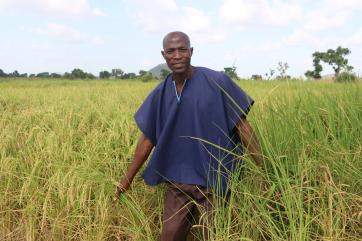
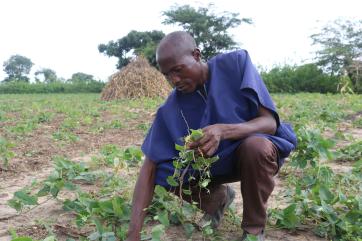
Ibrahim, 42, was born and raised in Tum community, he lives with his wife and two young children. He supports his family by buying and selling mostly grains as well as growing maize, rice, tomatoes, okra and cowpea beans, which he also sells. Although the insurgency did not affect him directly, two of his very close friends were affected and displaced so he has taken up the responsibility of providing for his and his friends’ families when needed.
Unpredictable weather changes makes it difficult for him to plan for the future as well as the high cost of fertilizers. With support from Mercy Corps’ BADI project, Ibrahim received improved seeds, crop protection products, and fertilizers. Ibrahim has found the crop protection products very useful as it helped in fighting the microorganisms that used to kill his plants and seeds. He plans on buying the products on his own when the support has ended.
He was one of the early adopters of all the products and training on climate resilient practices that Mercy Corps provided. “All the knowledge I gained has really transformed my farming that now other farmers even reach out to me for how to use these products and implement the farming practices because they can see how it has worked so well for me.”
Most of the farmers in the Northeast region grow mainly rainy season crops like maize, cowpea beans, and rice, this means that they are left to rely on what they have harvested until the next rainy season. Each year, the rains come later or earlier than expected as a result of climate change. Leaving these farmers to experience food shortages as they wait for their harvest to mature and stay idle during the dry season (harmattan).
One approach that Ibrahim was introduced to during the series of training Mercy Corps organized was dry season farming. He saw this a viable option to provide for his family and still be able to save his rainy season crops for when the demand for them increased during the dry season. This led him to try out the dry season farming with tomatoes he cultivated on a small plot of land with a capital of 1,200 NGN (about $3). “At the peak of the harvest I was able to get 80 baskets of tomatoes from just that small plot and I could make about 40,000 NGN (about $105) in a day from selling tomatoes even though they were in season and not very expensive. I continued harvesting and selling the tomatoes for about three months and made about 200,000 NGN (about $523) in total.”
From this experience Ibrahim learned he could make even more money from dry season farming and shared the success of his friend who also tried dry season farming and was able to buy a plot of land worth 930,000 NGN (about $2,430) from it; that was his motivation to continue. He plans to invest some of the money he made into buying supplies for his rainy season farming and trying other dry season crops like garden egg and onion during the next dry season.
He is an advocate for dry season farming because it protects him from the uncertainty of his rainy season farming and is considering going into mainly dry season farming. “When the rainy season does not favor my crops, with dry season farming I have something to fall back on. This gives me a chance to keep making money. I even want to go into dry season farming mainly so I plan on buying a pumping machine for watering my dry season crops.”
Mercy Corps through partnership with the National Agricultural Seeds Council identified and trained selected farmers within the project locations on community seed production. This is to ensure that smallholder farmers have access and can utilize quality seeds for improved crop yield that will ensure food availability and promote food security.
Ibrahim was one of the farmers selected as he was able to provide insight to other farmers on the crops he was planting at the time, maize and rice.. His community seed producer group has begun the process of registering themselves as a cooperative. Mercy Corps paid for the registration costs and Ibrahim’s group is waiting to get a certificate from the National Agricultural Seeds Council which would enable them to supply more people with the seeds they produce.
His hopes for the future are to give his children the best education and become one of the foremost seed producers in Biu and beyond.
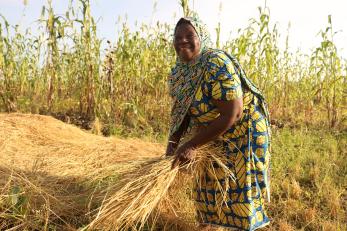
Maryam, 65, is a mother to five children and grandmother to 15 grandchildren. She lives with her last child, Harami, who is still in school and four of her grandchildren. Aside from farming, she supports her family by selling grains and cereals like beans, rice, guinea corn, maize, and soya beans from her house.
Limited access to land rights and ownership remain the greatest challenge for farmers like Maryam, who moved to Yawi Lawan in Borno state when she got married many years ago and has lived there ever since. Maryam’s husband passed many years ago, he left her with one small plot of land which is the only land she owns.
She usually has to pay about 10,000 NGN per year to rent land to farm on, and has to deal with several challenges in dealing with land owners. “Some people usually rent out their land for one to three years but after I would clear the land then the owner would say I can’t use it anymore. Or other times, I would have rented the land for three years, after the owner sees how good my crops are during harvest they wouldn’t allow me to use it in the next year. Then there are some landowners that would purposely rent their infertile land to you without telling you how it is.”
Maryam received training from BADI on better farming practices and was provided with organic agricultural input like crop protection products, fertilizers, improved seeds, personal protective equipment (PPE), and storage bags. She is also a member of a village savings and loans association (VSLA) group and was trained on VSLA methods by Mercy Corps.
One improved farming practice that Maryam tried out is mixed cropping, which is the practice of growing two or more crops in the same piece of land during one growing season. Now she has been able to maximize her small plot of land by planting a variety of crops such as sunflowers, rice, cow pea beans, cantaloupes, and sesame.
Maryam is delighted and reaping the benefits of the support Mercy Corps provided. “The products Mercy Corps gave me have cut down the costs I would have spent on input like crop protectants and fertilizers, and the training they gave me on how to apply the agricultural input properly has made all the difference in my harvest now. Also, the PPE also prevents me from getting bitten by snakes.
Climate change is still an avoidable problem for farmers in Nigeria. Benjamin Bivan, program lead of the BADI program explains how. “Some of the effects of climate change in North East Nigeria are the unpredictable rain pattern which makes it difficult for farmers to predict when to plant certain crops thereby affecting crop yield.”
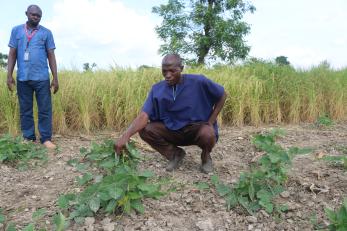
“Like this year, farmers are already complaining that the rainfall is not enough for their cowpea which they think will affect their yield.” Maryam is one of the farmers, dealing with the looming doom of not meeting her harvest target for her cowpea beans which are a significant source of her income.
“Another effect I have seen are the new and unknown variety of weeds that are attacking and crippling crops growth. Flooding has also become a yearly trend with farmlands being washed away by floods from heavy downpours more often than when compared to past patterns,” Benjamin Bivan tells us.
Maryam is sure of still making enough profit from the harvest of her other crops, with which she hopes to use to buy a smaller plot of land close to her house so she would not have to walk long distances to get to her farm anymore. But most of her greatest hope is, “I want to be able to provide food and meet my family’s basic needs.”